 |
- OTHER SERVICES VOICES:
- MARINES
 - NAVY
 - AIR FORCE
 - ARMY
 - COAST GUARD
|
An up close and personal interview with Coast Guard Veteran and Togetherweserved.com Member:
Captain Robert Bacon (USCG 1954-1982)
WHAT PERSUADED YOU TO JOIN THE COAST GUARD?
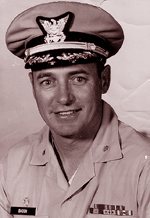 I was raised in up-state New York in Gloversville, a small town of some 23,000 when I was a youngster. My mother’s ancestors were Dutch, in the future United States from the early 18th century. My father’s ancestors came to Gloversville from Wilton, Connecticut near Hartford, he worked in a glove factory. We didn’t have much money but we were fortunate that he did not lose his job during the depression. In the 8th grade I decided when I got to high school I would take the regular curriculum. But later I made a decision to change to the pre-college curriculum; that was a life altering decision. I was raised in up-state New York in Gloversville, a small town of some 23,000 when I was a youngster. My mother’s ancestors were Dutch, in the future United States from the early 18th century. My father’s ancestors came to Gloversville from Wilton, Connecticut near Hartford, he worked in a glove factory. We didn’t have much money but we were fortunate that he did not lose his job during the depression. In the 8th grade I decided when I got to high school I would take the regular curriculum. But later I made a decision to change to the pre-college curriculum; that was a life altering decision.
I did not give very much thought to West Point or Annapolis because my family was not politically connected and it looked like you had to be to have any chance of an appointment to either. But the Coast Guard Academy was by competitive exam and personal assessment. If I made it I’d be able to get a free education; that was what I was after because we had no money to pay for college. My cousin and I went to New York City to take the exam. He passed and was accepted but I didn’t make it. I took some additional math courses and went back the following year, passed the exam and was accepted into the CGA class of 1954. I didn’t set out to have a career in the Coast Guard but that is how it turned out.
BRIEFLY, WHAT WAS YOUR CAREER PATH IN THE SERVICE?
My career in the Coast Guard was very much as a shipboard officer. I had five tours of sea duty in three cutters, on both the Atlantic and Pacific, including two tours in command and one as XO. I also sailed on cadet cruises as an instructor while at the Coast Guard Academy. I qualified as both a shipboard engineer and as a deck officer and spent most of my seagoing service on the bridge. Ashore I had mostly surface operations assignments with one tour, as a Lieutenant (Junior Grade), commanding a LORAN station in the Philippines. Later I also had a very enjoyable tour ashore as XO of Base Honolulu.
During my career I made about 30 ocean station patrols altogether, in both the Atlantic and Pacific. On the Atlantic side the cutters were assigned to one of several stations ranging from the North Atlantic off Labrador to a southern station between Bermuda and the Azores. Each patrol took us out for about 35 days, including steaming time to and from station. Ocean station Charlie was the roughest. We came in to Portland once with two degrees of list from the weight of ice on the superstructure. My practice was to put men on restriction (AWOL offenses for the most part) on work details to break up the ice in port.
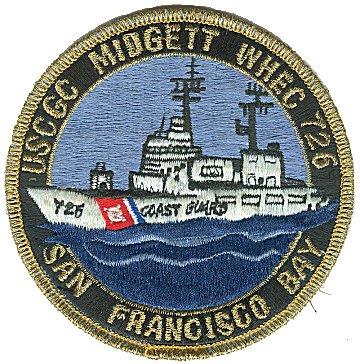
In Hawaii I was Executive Officer of Bering Strait, (1967-69), a 311’ WHEC. We made three double patrols to Ocean Station Victor. A double patrol consisted of proceeding from Hawaii to Victor, between Midway Island and Japan, where we relieved the cutter on station. After the patrol period and arrival of our relief, we went to Japan for rest and repair then back to Victor for another patrol before returning home to Hawaii. From homeport to homeport a double Victor patrol took about three months. On the west coast I also commanded the 378’ WHEC Midgett (1975-’77) and we spent our time on Alaska Patrol (similar to the old Bering Sea Patrol); joining the long line of cutters that have made that patrol since Alaska became a U.S. possession.
DID YOU PARTICIPATE IN COMBAT OPERATIONS?
While I was XO of Bering Strait we deployed to Vietnam as one of the five cutters assigned to the original Coast Guard Squadron Three. We made six coastal patrols of 30 to 50 days off of then South Vietnam as an element of Task Force 115 called “Market Time.” We took no hostile fire but did provide some gunfire support with our five inch cannon. We also served as a mobile base for two USN Swift boats. There were four crews, with two crews alternated daily giving each a 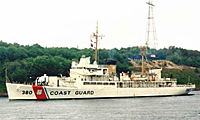 day’s rest in between patrols. day’s rest in between patrols.
When we came off the line and called at Hong Kong, Bering Strait was the first Coast Guard cutter to serve as station ship. Both the UK and USN port reps were anxious about a CG cutter serving in that role, one that included providing shore patrol, ship scheduling and communications. When we completed that duty they recognized that not only could Bering Strait and the Coast Guard crew do the job but we provided the best communications support in living memory.
did you receive any awards for valor?
I have Coast Guard and USN unit commendations and the “also there” medals for Vietnam service both U.S. and RVN and National Defense with bronze star for a career spanning two Cold War eras..
FROM YOUR ENTIRE SERVICE CAREER WHAT PARTICULAR MEMORY STANDS OUT?
I was discussing this question the other day with another retired Coast Guard officer and this is what came to mind. In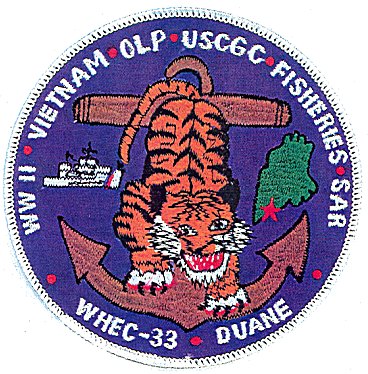 1972, while commanding Duane, we were one of a trio of cutters that made the cadet practice cruise that summer; Owasco and Morgenthau were the other two ships. I had a great XO at the time, Lieutenant Commander Roger Bing, who came to the Coast Guard out of a Merchant Marine Academy; it may have been Fort Schuyler, the NY State Merchant Marine Academy. With my confidence in him and my background on the faculty at the Academy, I decided that with the Duane we would put the cadets into officer and crew positions. It is the practice on cadet cruises to place cadets in crew positions to train them and get them the experience they would need later on. We carried it a step further. We let them do exercises also such as Under way Replenishment where they did the entire job with crew and officer overlooking them, they would actually do the tasks with our regular cadre providing oversight. Some of the cadets were uncomfortable and apprehensive but as they gained confidence they settled in and it was a great learning experience. I don’t believe the other cutters let their cadets do that. So they stood deck and engineering watches and did all the other things that a regular crew would do. Departing our first European port call for fuel at Bergen, Norway I let them take the ship back out to sea. They were on the bridge four hours before we left, planning, reviewing charts and making ready. They did just fine. We took a great deal of satisfaction in our approach that gave them real hands on experience. 1972, while commanding Duane, we were one of a trio of cutters that made the cadet practice cruise that summer; Owasco and Morgenthau were the other two ships. I had a great XO at the time, Lieutenant Commander Roger Bing, who came to the Coast Guard out of a Merchant Marine Academy; it may have been Fort Schuyler, the NY State Merchant Marine Academy. With my confidence in him and my background on the faculty at the Academy, I decided that with the Duane we would put the cadets into officer and crew positions. It is the practice on cadet cruises to place cadets in crew positions to train them and get them the experience they would need later on. We carried it a step further. We let them do exercises also such as Under way Replenishment where they did the entire job with crew and officer overlooking them, they would actually do the tasks with our regular cadre providing oversight. Some of the cadets were uncomfortable and apprehensive but as they gained confidence they settled in and it was a great learning experience. I don’t believe the other cutters let their cadets do that. So they stood deck and engineering watches and did all the other things that a regular crew would do. Departing our first European port call for fuel at Bergen, Norway I let them take the ship back out to sea. They were on the bridge four hours before we left, planning, reviewing charts and making ready. They did just fine. We took a great deal of satisfaction in our approach that gave them real hands on experience.
WHICH INDIVIDUAL PERSON FROM YOUR SERVICE STANDS OUT AS THE ONE WHO HAD THE BIGGEST IMPACT ON YOU...AND WHY?
There were not just one but several of my CO’s, shipboard officers with whom I served and some petty officers who set good examples.
WHAT PROFESSION DID YOU FOLLOW AFTER THE SERVICE AND WHAT ARE YOU DOING NOW?
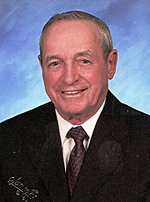
You can see from my career that I enjoyed going to sea and that is what I returned to after retiring from the Coast Guard. For 13 years I sailed as Chief Mate with the Military Sealift Command. Now I do volunteer work with the police department and a hospice as well as activities at my church. I belong to the Navy League and MOAA local chapters.
HOW HAS SERVING IN THE COAST GUARD INFLUENCED THE WAY YOU NOW APPROACH YOUR LIFE AND CAREER?
Working in an organization with people, knowing how to organize and get along with others; understanding the importance of discipline. I can see good examples now of former service men who perform outstanding jobs in the community.
HOW HAS TOGETHERWESERVED.COM HELPED YOU TO MAINTAIN A BOND WITH THE SERVICE AND THOSE YOU SERVED WITH?
I'm still relatively new to the site but I'm impressed with what I've found so far. TWS is a great place to share your entire service history and to locate and communicate with old friends in the process.
CGTWS Member CDR Bob Douville kindly assisted in the preparation of this interview.
|
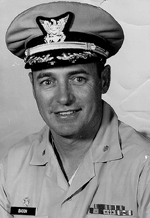
Captain Robert Bacon

View Capt Bacon's Shadow Box on TWS

Read Other Interviews in the TWS Voices Archive
|
|
Share this Voices Edition on:


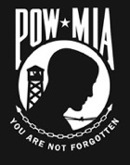
 |
|
TWS VOICES
TWS Voices are the personal stories of men and women who served in the US Military and convey how serving their Country has made a positive impact on their lives. If you would like to participate in a future edition of Voices, or know someone who might be interested, please contact Major Wesley Prater HERE.
This edition of CoastGuard Voices was supported by:
CoastGuard.Togetherweserved.com
For current and former serving Members of the US Coast Guard and US Coast Guard Reserve, TogetherWeServed is a unique, feature-rich resource enabling Coast Guardsmen to re-connect with lost Shipmates, share memories and tell their Coast Guard story.
To join CoastGuard.Togetherweserved.com, please click HERE.
|
|